The Research Center for Multiculturalism and Intersectionality in Complex Cities (MICCS, https://miccskyoto.jp/) was established in July 2021 at Doshisha University in Kyoto to analyze the issues of migration, multiculturalism, and discrimination in urban spaces. Our members are mostly sociologists, but we also have anthropologists, historians, and political scientists who work on various topics, such as transnational migration, race and ethnic relations, segregation, gentrification, conviviality, racism, xenophobia, and colonialism. In addition, our members are all experts in intersectional (gender, race, class, space, etc.) and comparative (spatial and temporal) based on their academic work.
With over 30 researchers, most of whom carry out their fieldwork outside of Japan (East Asia, Southeast Asia, Africa, North America, Latin America, and Europe) and three members of the secretariat (see the list at https://miccskyoto.jp/en/about/), the MICCS attaches great importance to international exchanges, which are essential, especially post-Covid-19. Through a number of grants, such as the “Global Mediterranean,” a six-year project funded by the National Institutes for the Humanities (NIHU), and the Fund for Promotion of Joint International Research from the Japan Society for Promotion of Sciences (JSPS), MICCS is developing international collaborations in several forms. In addition, MICCS took advantage of its privileged location in the center of Kyoto, a former capital city internationally recognized and unique for its beauty and history, and a city of knowledge due to its concentration of many renowned university and academic institutions.
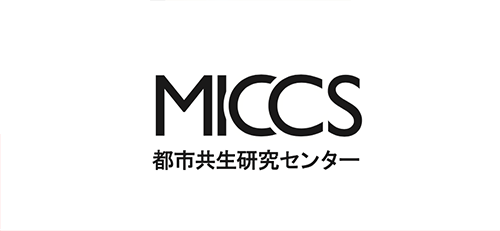
One form of international collaboration is the invitation program for foreign researchers. Given our aim to develop exchanges and collaborations we prioritize researchers who are themselves active overseas and interested in working with MICCS members. We invited seven international researchers in 2023 (January to October).
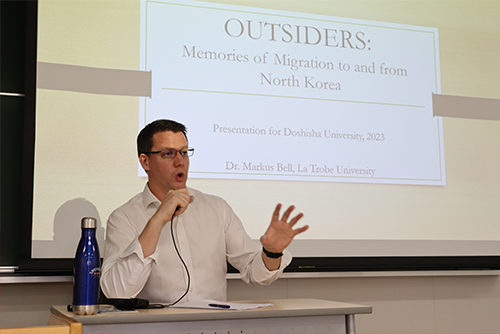 Dr. Markus Bell, a researcher at La Trobe University, Melbourne, was our guest in March 2023. Specializing in the issues of refugees, human trafficking, and labor migration, Dr. Bell spoke about his latest book, Outsiders: Memories of Migration to and from North Korea (Berghahn Books, 2023). He explored the hidden histories of men, women, and children who left Japan in the 1960s for North Korea, which is the world’s most secretive state. Through strikingly detailed ethnographic descriptions and meticulous interviews with North Korean fugitives, he revealed the driving force behind thousands of ordinary people who risked everything to leave Kim Il-Sung’s “workers’ paradise,” to return to Japan half a century later.
Dr. Markus Bell, a researcher at La Trobe University, Melbourne, was our guest in March 2023. Specializing in the issues of refugees, human trafficking, and labor migration, Dr. Bell spoke about his latest book, Outsiders: Memories of Migration to and from North Korea (Berghahn Books, 2023). He explored the hidden histories of men, women, and children who left Japan in the 1960s for North Korea, which is the world’s most secretive state. Through strikingly detailed ethnographic descriptions and meticulous interviews with North Korean fugitives, he revealed the driving force behind thousands of ordinary people who risked everything to leave Kim Il-Sung’s “workers’ paradise,” to return to Japan half a century later.
In April 2023, Professor Marwan Mohammed came from Paris to conduct research at MICCS. Professor Mohammed is a sociologist and researcher at CNRS (French National Centre for Scientific Research). He specializes in the sociology behind delinquency and youth, as well as discrimination, and has published several books, including Islamophobia in France: The Construction of the “Muslim Problem” (Sociology of Race and Ethnicity, University of Georgia Press, 2023). Professor Mohammed examined how Islam and Muslims have been represented in French society, and the context in which such representations have been constructed as “problems” using the concept of “Islamophobia” as a starting point. The lecture was followed by a commentary from Professor Shintaro Namioka (Meijigakuin University), a specialist in the Muslim movement in France, which led to a lively discussion with the audience.
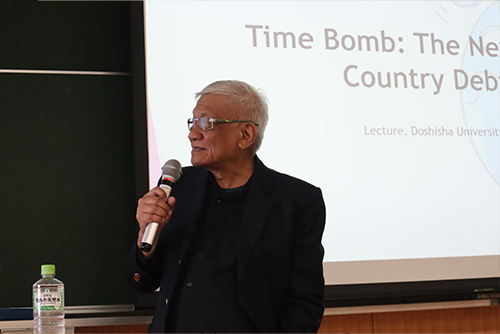 In June 2023, Filipino sociologist Walden Bello was our guest. An internationally recognized human rights activist, with a PhD in sociology from Princeton University, Professor Bello is currently a visiting professor at the State University of New York at Binghamton and author of numerous publications, most recently Counterrevolution: The Global Rise of the Far Right (Nova Scotia: Fernwood, 2019). Professor Bello has examined the debt crises in developing countries (according to the World Bank, 53 countries are currently at risk) to understand the global structure in which they recur, thereby highlighting the contradictions of IMF-led globalization and ways to overcome them.
In June 2023, Filipino sociologist Walden Bello was our guest. An internationally recognized human rights activist, with a PhD in sociology from Princeton University, Professor Bello is currently a visiting professor at the State University of New York at Binghamton and author of numerous publications, most recently Counterrevolution: The Global Rise of the Far Right (Nova Scotia: Fernwood, 2019). Professor Bello has examined the debt crises in developing countries (according to the World Bank, 53 countries are currently at risk) to understand the global structure in which they recur, thereby highlighting the contradictions of IMF-led globalization and ways to overcome them.
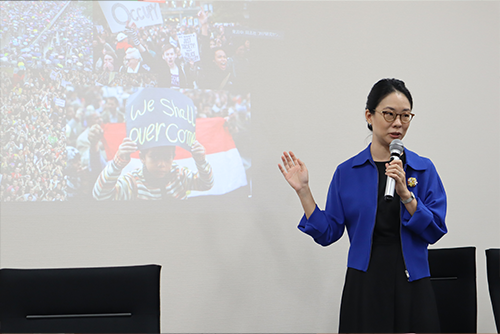 In July 2023, our guest was Sharon J. Yoon, Associate Professor of Korean Studies at the University of Notre Dame. Professor Yoon is a sociologist specializing in the Korean diaspora and the author of The Cost of Belonging: Solidarity and Mobility in Beijing’s Koreatown (Oxford University Press, 2021). In this lecture, she spoke about her second book, Place in the Age of Activism: The Fight Against Hate in Osaka’s Koreatown (under contract with Columbia University Press), where she examined an anti-racist movement aimed at the rise of Korean hate demonstrations in Tsuruhashi, Osaka’s largest Korean enclave. She emphasized the importance of social media in this movement to show how the Korean enclave became an important site of politicization, transforming disordered sympathizers into committed activists.
In July 2023, our guest was Sharon J. Yoon, Associate Professor of Korean Studies at the University of Notre Dame. Professor Yoon is a sociologist specializing in the Korean diaspora and the author of The Cost of Belonging: Solidarity and Mobility in Beijing’s Koreatown (Oxford University Press, 2021). In this lecture, she spoke about her second book, Place in the Age of Activism: The Fight Against Hate in Osaka’s Koreatown (under contract with Columbia University Press), where she examined an anti-racist movement aimed at the rise of Korean hate demonstrations in Tsuruhashi, Osaka’s largest Korean enclave. She emphasized the importance of social media in this movement to show how the Korean enclave became an important site of politicization, transforming disordered sympathizers into committed activists.
In addition to public lectures, the MICCS organizes methodology seminars for young researchers and students. These seminars require registration and are held in small groups (a maximum of 20 people) to promote dialogue and exchange between our guests and young researchers.
For example, Dr. Bell led a workshop on ethnographic methodology for doctoral students, which was attended by 15 researchers. After a short presentation on the historical evolution of ethnographic methods from classical to modern ethnography and the advantages, limitations, and ethical underpinnings of these methods, he opened the dialogue with the participants who spoke of their own difficulties in ethnographic research, after which Bell gave them advice.
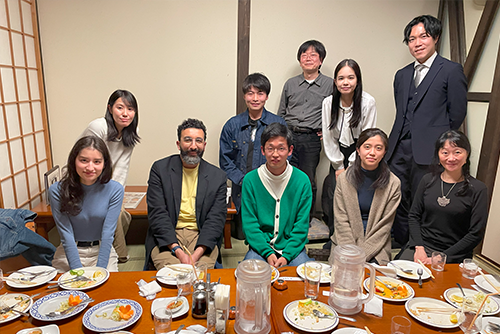 Professor Mohammed led another methodology workshop titled “Fear of violence and fieldwork in so-called dangerous areas.” Drawing on his personal experiences and research on organized crime in France, he discussed different ways of measuring and managing the risks of violence specific to certain areas to produce sociological knowledge. His talk inspired over two hours of fascinating discussion with master’s and doctoral students, as well as young researchers working in the field, such as the slums of Manila in the Philippines.
Professor Mohammed led another methodology workshop titled “Fear of violence and fieldwork in so-called dangerous areas.” Drawing on his personal experiences and research on organized crime in France, he discussed different ways of measuring and managing the risks of violence specific to certain areas to produce sociological knowledge. His talk inspired over two hours of fascinating discussion with master’s and doctoral students, as well as young researchers working in the field, such as the slums of Manila in the Philippines.
The MICCS invitation program aims to develop medium- and long-term collaborations with visiting researchers and their institutions. One example is our collaborative partnership with LADSIS (Laboratoire de Recherche sur les différenciations socio-anthropologiques et les identités sociales) at the Faculté des Lettres et des sciences humaines de Aïn Chock, Université Hassan II de Casablanca. Professor Mohammed, who works with this laboratory, invited us to the international conference titled “Migration and interethnic relations in Maghreb and Europe: New theoretical and methodological approaches,” that will be held from October 19 to 21 in Casablanca, Morocco. The purpose of this event is to create a space for scientific exchange and epistemological and theoretical reflection on methodologies and approaches in sociology and to reinterrogate the sociological tradition centered on the Western world and develop the possibilities of decentering sociology, an objective in which collaboration between a center like ours and a center based in Maghreb (LADSIS) could play an important role.
Open to established professors and young researchers alike with an interest in diverse geographical areas and a focus on subjects crucial to understanding contemporary societies (migration, cities, racism, discrimination, etc.), MICCS intends to create genuine sociological bridges, stimulating the most innovative thinking on the major issues facing the modern world through interdisciplinary exchanges and transnational collaborations.